Do you find yourself dealing with someone who constantly pushes your limits? Setting boundaries with a narcissist can be tough but we will help you reclaim your space!
One of the most difficult aspects of being tangled in a narcissist’s web is learning to set firm boundaries with them.
Narcissists typically have poor boundaries themselves; they like to win and maintain power, and they don’t like others setting boundaries on them.
They even feel above the boundaries of the law — they don’t follow court orders and they find personal boundaries easy to violate.” ~Karyl McBride, MD How to stop a boundary-busting narcissist
If you’re in a relationship with a toxic narcissist or have ever been in one, you might have a few boundary issues, am I right?
Have you ever thought about the boundaries you had for yourself and your life before you met the narcissist versus the ones you have now, or that you had during the relationship?
Wait. Before you answer that, let me clarify something.
I’m not talking about the fun or silly “I’ll never wear bell bottoms” kind of boundary here (had it, crossed it, can’t wait to do it again, y’all).
I’m talking about the serious, intrinsic, deep down in your gut, “gotta stick to it or your tummy will hurt” kind of boundary.
So, let me ask you – have your basic personal standards changed (or been altered) as a result of a relationship with a toxic narcissist?
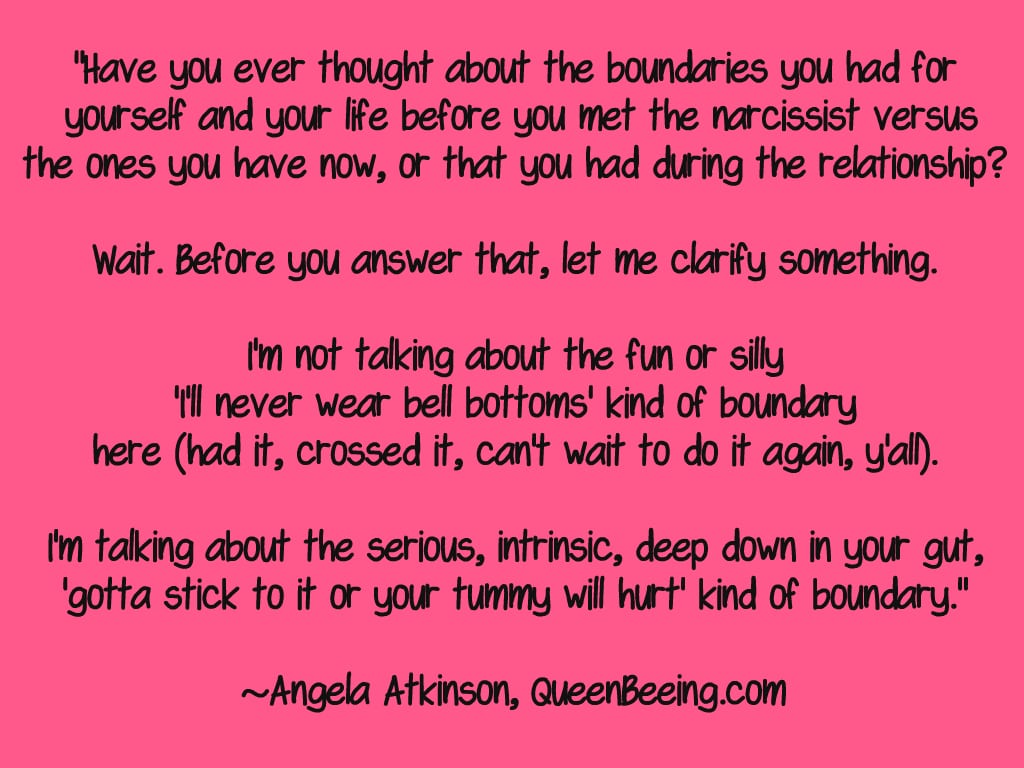
And, while we’re asking questions – if you’re unfortunate enough to have a narcissistic parental figure or to have been in the relationship longer than you should, do you even really know what your personal boundaries are, nor have they been defined for you?
Narcissists have a way of always pushing your boundaries, sometimes even as a way to amuse themselves when they get bored.
No, I’m not kidding and that is NOT an exaggeration. I’ve been told by more than one narcissist that they just “like to mess with people,” or that they “intentionally start drama to see what people will do.”
They think it’s funny. But sometimes, their agenda is more calculated than “just to amuse myself,” and that’s when you’ve got to be especially cautious.
And that’s because, when it comes to dealing with a narcissist on the regular, you’ve got to recognize that a certain amount of conditioning happens to all of us – even and maybe especially those of us who are very intelligent.
You might find yourself in a panic if you have to stand up for yourself or to say “no” to someone – and you might even have physical symptoms that include dry mouth, dissociation(where you get kind of confused and foggy) and you might even feel dizzy, nauseous or plain old anxious.
Related: How Narcissists Make You Physically Sick and 5 Ways To Restore Your Health
And, of course, this is exactly what the narcissist wants, because it allows him to remain in control. He knows that if he nags, discredits you and/or the boundary he’s repeatedly (or for the first time) crossed, you will eventually get tired of fighting and you’ll just “let it go,” as in, accept it, or at least not require him to justify or discuss it.
This allows the toxic cycle to continue and repeat.
An Example of The Narcissistic Boundary Busting Cycle (IRL)
So, what does this cycle look like in real life?
Let’s use this fictitious situation as an example. So, we’ve got this couple, Ned and Jane. Ned is a narcissist, and Jane, his semi-willing victim.
They made a deal at the beginning of their relationship that neither would have close friends of the opposite sex. This deal was made at the request of Ned, and Jane happily complied, letting go of several close male friends to secure her place in Ned’s fickle heart.
Years later, Ned suddenly begins several new friendships with ladies at his office, and then within the couple’s shared social circles. This doesn’t sit well with Jane, who has consistently avoided friendships with the opposite sex since the boundary was set by Ned in the beginning.
Jane raises concerns, and Ned tells her she’s being paranoid, that she’s got nothing to worry about, but that maybe he (Ned) does – because, clearly, Jane doesn’t blindly trust him.
And you KNOW a narcissist needs his victims to blindly trust him – if they don’t, he will do everything in his power to break them until they at least APPEAR to behave as he wishes.
Instead of attempting to soothe Jane’s fears, Ned plays them up and makes Jane feel like she’s worthless and this continued manipulation and gaslighting makes her afraid of asking about any of his choices, ever, lest he unleashes a fury that only a narcissist can – the narcissistic injury and narcissistic rage one-two punch.
So:
1. Ned the narcissist oversteps Jane’s personal boundary.
2. Jane complains, resists, or refuses.
3. He pushes, pleads, prods discredits, and pressures until Jane gives in and accepts the overstep.
4. She redefines her boundary and says something like, “Okay, fine, you can have female friends, but I better never find you hanging out with one alone!”
5. Hours/weeks/days later, when she catches the narcissist doing (or not doing) what she asked him (to do or not do), she obviously confronts him again, reminding him of the previously crossed and redefined boundary.
6. Rinse and repeat. The cycle goes back through the steps.
Related: How To Know If You’re Dating a Narcissist
So, how to set relationship boundaries with a narcissist?
Okay, let’s talk about relationship boundaries, shall we?
While everyone’s a little different, there are certain basic boundaries that most everyone could benefit from setting in their lives, if they haven’t already.
When someone oversteps a relationship boundary in an otherwise healthy relationship, whether it’s spoken or unspoken, it becomes a serious concern for everyone involved.
The person whose boundary has been “overstepped” is made to feel uncomfortable (or worse) and the person who did the stepping doesn’t probably feel much better, assuming he’s not a narcissist.
In most cases, the boundaries can be easily defined and for most people, they can be maintained without extreme effort.
However, some people, especially those who have a tendency to lean toward “people-pleasing,” like me, tend to have trouble enforcing boundaries with people who fail to recognize them time and again – enter the narcissist, because you know that they love people pleasers and empaths.
This, of course, leads to a clouding of our general purpose in life, which can lead to depression, anxiety, and a number of other emotionally debilitating concerns – all of which can eventually lead to more serious and potentially harmful physical issues.
So what can you do if you’re stuck in a relationship with a boundary-busting narcissist?
I suggest you try the gray rock rule.
Start Here: Set New Boundaries to Enjoy Healthier Relationships
While many relationships have the capacity to become “good for you,” those with toxic narcissists are generally ill-fated. Still, the fact is that every relationship needs boundaries if you personally want to stay healthy.
Want a simple way to define what a relationship boundary looks like?
Think about it this way: there are certain things you discuss with your best friend that you’d never discuss with your child or your mother. Right?
See, boundaries help to determine how much you give and receive from a relationship.
If any of your relationships are leaving you irritable and overwhelmed, reexamine your boundaries. That’s a good sign that it’s time to redefine them.
The boundaries you set in your relationships are a reflection of your ego and self-esteem.
If you have a low sense of self-worth, your boundaries are going to be unhealthy. You’ll likely be too focused on trying to please others and receive love and approval. You’ll be overextending yourself and demanding too little from the narcissist.
If your ego is over-inflated, your boundaries are aggressively set to maximize your own utility. It’s your way or the highway. (That’s the role usually played by the narcissist.)
For best results, seek a middle ground when setting boundaries.
Using these strategies will help you set boundaries that are empowering for both parties.
Decide on your core values.
- What is your comfort level?
- Are you comfortable discussing your personal finances with others?
- Do you like friends or family just showing up at your front door or would you like a little warning?
- Are you willing to let others borrow your car, money, or a cup of sugar?
- How much honesty do you want to give and receive?
Some of these values will vary depending on the other person. You might let your best friend borrow your car, but no one else. Certain people might be able to spend the night on your couch while others cannot.
Related: 8 Things A Narcissist Fears The Most
1. Determine what you need from the relationship.
Communicate your needs to the other person in a healthy, non-blaming manner. This will require some measure of assertiveness. It’s not fair to expect anyone to read your mind and predict all of your wants and needs.
2. Determine the other person’s needs.
Think “win-win” and approach the other person with a pleasant conversation about their wishes and needs in the relationship.
3. Determine the consequences.
How will you handle it if someone violates your boundaries? Remind others of your boundaries and then take action. If someone shows up unannounced, don’t let him in your home. If she’s late again, you could leave and go somewhere else.
4. Be consistent.
It’s natural for others to test you when you change the rules. It’s important to be consistent, or you won’t be taken seriously. Follow through and keep your word. One slip into your old patterns and you’ll probably have a battle on your hands.
Related: Why Do We Need Boundaries With People We Love?
5. Be prepared to let go.
It’s likely that some individuals will keep on behaving the same way, regardless of your efforts. If a person is unable or unwilling to appreciate your boundaries and requirements, it might be best to reexamine the relationship.
Are your relationship boundaries working for you? Redefining a relationship can be challenging and stressful. Change isn’t always popular. When people can no longer take advantage of you, you’re sure to experience some resistance. But when you maintain your efforts consistently, you and those around you will all ultimately benefit.
Written By Angela Atkinson
Originally Published On Queenbeeing.com
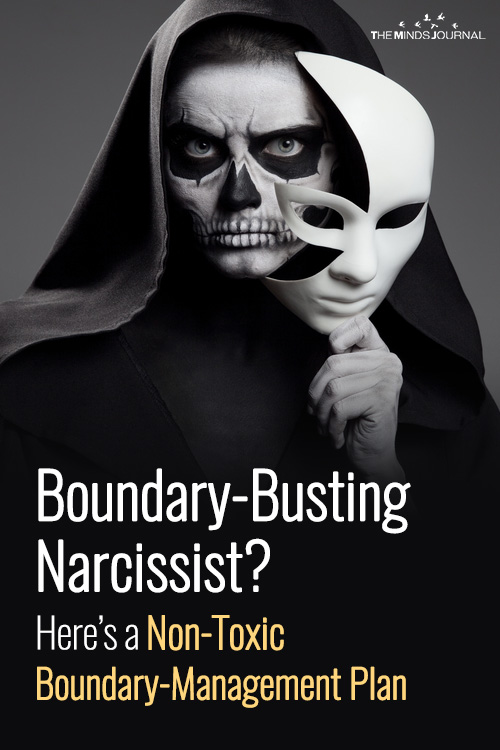
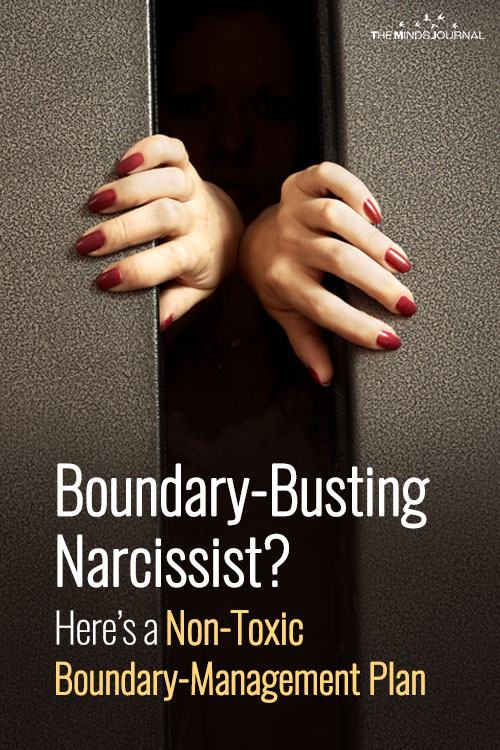
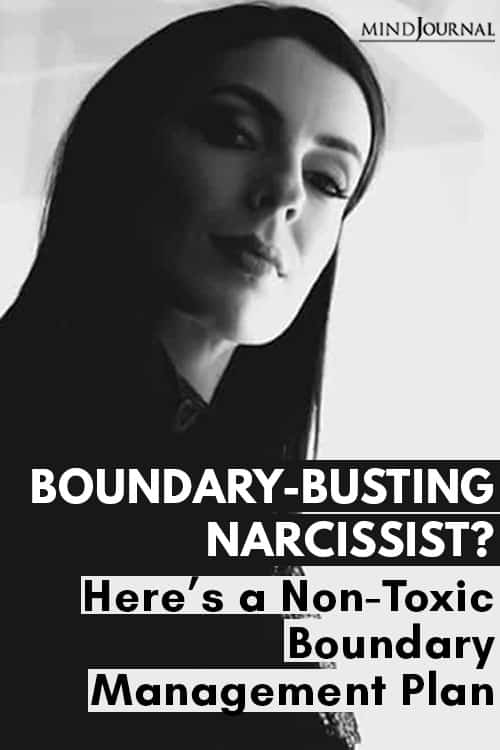


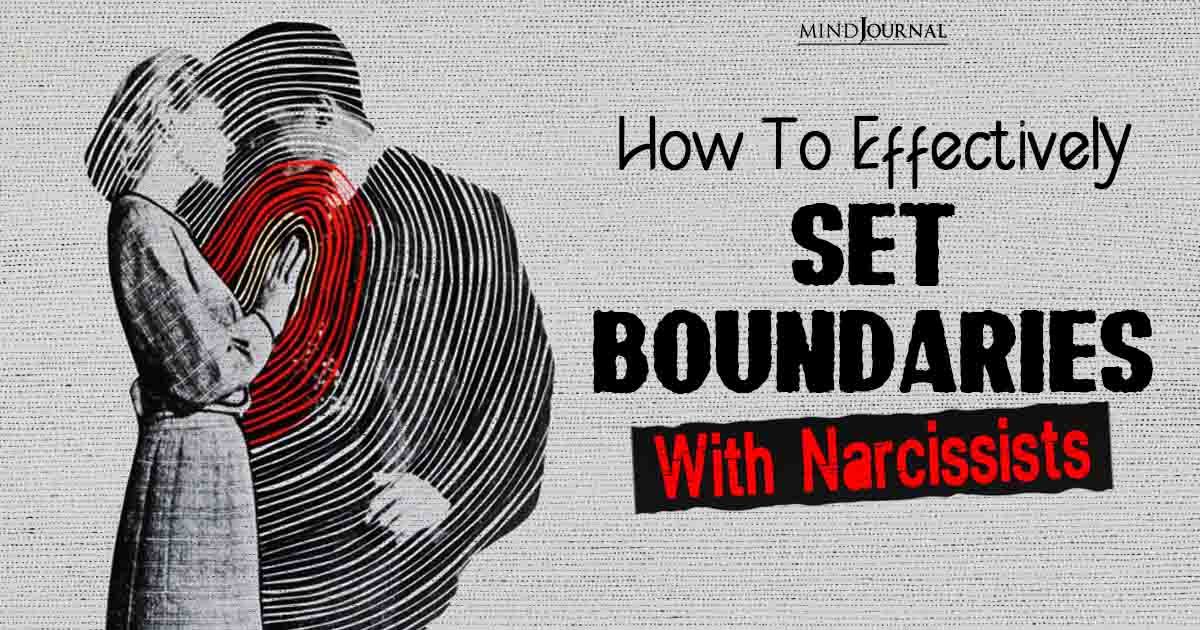







Leave a Reply